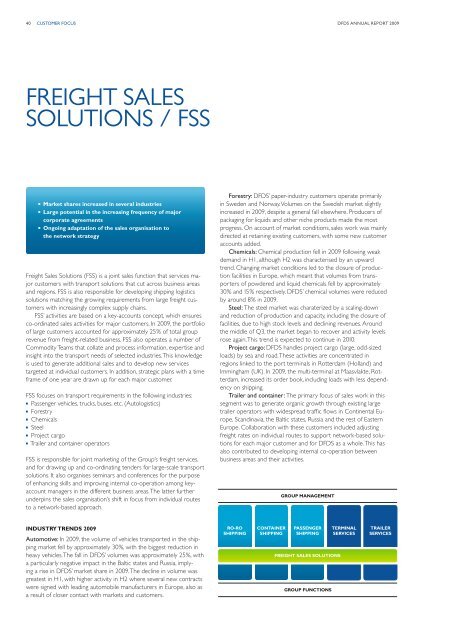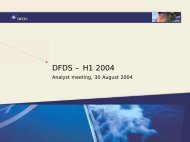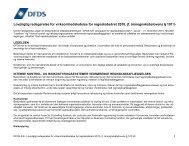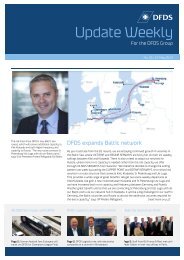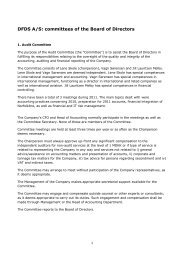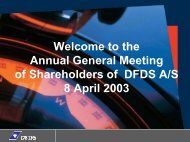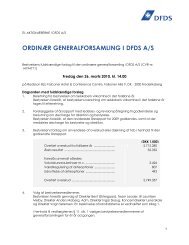English - DFDS
English - DFDS
English - DFDS
Create successful ePaper yourself
Turn your PDF publications into a flip-book with our unique Google optimized e-Paper software.
40 Customer Focus<br />
<strong>DFDS</strong> annual report 2009<br />
Freight Sales<br />
solutions / FSS<br />
n Market shares increased in several industries<br />
n Large potential in the increasing frequency of major<br />
corporate agreements<br />
n Ongoing adaptation of the sales organisation to<br />
the network strategy<br />
Freight Sales Solutions (FSS) is a joint sales function that services major<br />
customers with transport solutions that cut across business areas<br />
and regions. FSS is also responsible for developing shipping logistics<br />
solutions matching the growing requirements from large freight customers<br />
with increasingly complex supply chains.<br />
FSS’ activities are based on a key-accounts concept, which ensures<br />
co-ordinated sales activities for major customers. In 2009, the portfolio<br />
of large customers accounted for approximately 25 % of total group<br />
revenue from freight-related business. FSS also operates a number of<br />
Commodity Teams that collate and process information, expertise and<br />
insight into the transport needs of selected industries. This knowledge<br />
is used to generate additional sales and to develop new services<br />
targeted at individual customers. In addition, strategic plans with a time<br />
frame of one year are drawn up for each major customer.<br />
FSS focuses on transport requirements in the following industries:<br />
n Passenger vehicles, trucks, buses, etc. (Autologistics)<br />
n Forestry<br />
n Chemicals<br />
n Steel<br />
n Project cargo<br />
n Trailer and container operators<br />
FSS is responsible for joint marketing of the Group’s freight services,<br />
and for drawing up and co-ordinating tenders for large-scale transport<br />
solutions. It also organises seminars and conferences for the purpose<br />
of enhancing skills and improving internal co-operation among keyaccount<br />
managers in the different business areas. The latter further<br />
underpins the sales organisation’s shift in focus from individual routes<br />
to a network-based approach.<br />
Forestry: <strong>DFDS</strong>’ paper-industry customers operate primarily<br />
in Sweden and Norway. Volumes on the Swedish market slightly<br />
increased in 2009, despite a general fall elsewhere. Producers of<br />
packaging for liquids and other niche products made the most<br />
progress. On account of market conditions, sales work was mainly<br />
directed at retaining existing customers, with some new customer<br />
accounts added.<br />
Chemicals: Chemical production fell in 2009 following weak<br />
demand in H1, although H2 was characterised by an upward<br />
trend. Changing market conditions led to the closure of production<br />
facilities in Europe, which meant that volumes from transporters<br />
of powdered and liquid chemicals fell by approximately<br />
30 % and 15 % respectively. <strong>DFDS</strong>’ chemical volumes were reduced<br />
by around 8 % in 2009.<br />
Steel: The steel market was charaterized by a scaling-down<br />
and reduction of production and capacity, including the closure of<br />
facilities, due to high stock levels and declining revenues. Around<br />
the middle of Q3, the market began to recover and activity levels<br />
rose again. This trend is expected to continue in 2010.<br />
Project cargo: <strong>DFDS</strong> handles project cargo (large, odd-sized<br />
loads) by sea and road. These activities are concentrated in<br />
regions linked to the port terminals in Rotterdam (Holland) and<br />
Immingham (UK). In 2009, the multi-terminal at Maasvlakte, Rotterdam,<br />
increased its order book, including loads with less dependency<br />
on shipping.<br />
Trailer and container: The primary focus of sales work in this<br />
segment was to generate organic growth through existing large<br />
trailer operators with widespread traffic flows in Continental Europe,<br />
Scandinavia, the Baltic states, Russia and the rest of Eastern<br />
Europe. Collaboration with these customers included adjusting<br />
freight rates on individual routes to support network-based solutions<br />
for each major customer and for <strong>DFDS</strong> as a whole. This has<br />
also contributed to developing internal co-operation between<br />
business areas and their activities.<br />
GROUP MANAGEMENT<br />
Industry trends 2009<br />
Automotive: In 2009, the volume of vehicles transported in the shipping<br />
market fell by approximately 30 %, with the biggest reduction in<br />
heavy vehicles. The fall in <strong>DFDS</strong>’ volumes was approximately 25 %, with<br />
a particularly negative impact in the Baltic states and Russia, implying<br />
a rise in <strong>DFDS</strong>’ market share in 2009. The decline in volume was<br />
greatest in H1, with higher activity in H2 where several new contracts<br />
were signed with leading automobile manufacturers in Europe, also as<br />
a result of closer contact with markets and customers.<br />
RO-RO<br />
SHIPPING<br />
CONTAINER<br />
SHIPPING<br />
PASSENGER<br />
SHIPPING<br />
FREIGHT SALES SOLUTIONS<br />
GROUP FUNCTIONS<br />
TERMINAL<br />
SERVICES<br />
TRAILER<br />
SERVICES


